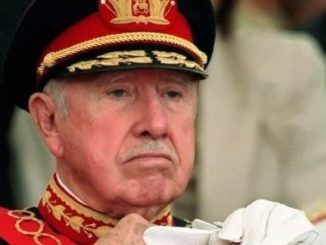
By Mohsin Abbas / Publisher, The Santiago Times
SANTIAGO – Chile needs to make trade real for its people in order to stay aligned with globalization, stressed François-Philippe Champagne as he pushed Canada’s progressive trade agenda in Santiago last week.
“Canada and Chile may be at opposite ends of the American continent, but we are both Pacific nations resisting the tide of protectionism. We know that our prosperity lies not in isolation but in openness and the pursuit of free trade between nations,” Champagne said before he flew to Peru after attending the 20th anniversary of the Canada-Chile Free Trade Agreement.
Mr. Champagne, who is the Minister for International Trade of Canada, was addressing a gathering of Chilean and Canadian ministers, officials and business community. “The common values that led to our trade agreement have promoted not only our prosperity but a fruitful and growing relationship,” the minister said on the occasion.
This was Mr. Champagne’s first visit to Chile as the minister. He recognized and thanked Chile’s ex-president Frei Ruiz-Tagle for his role in putting this agreement in place as president of Chile in 1997.
He also acknowledged the contribution of Eduardo Aninat, who was the Minister of Finance responsible for the negotiation of the agreement with his Canadian counterpart Roy MacLaren. Mr. Aninat now sits on Scotiabank’s board of directors.
As he thanked the founder of the Canada-Chile Chamber of Commerce for his vision – Canada’s first free trade agreement with any country in Central or South America – Mr. Champagne said: “We have in Chile a partner committed to a rules-based, fair trading environment and a progressive and open trade agenda.“
The common values that led to our trade agreement have promoted not only our prosperity but a fruitful and growing relationship.
“But if we fail in making trade real for people, we lose the social license necessary to make the deals we forged together 20 years ago,” the Canadian feared while highlighting the need of following progressive trade agenda.
Progressive trade
As economic growth in the developed world has essentially flat-lined, Canada is pursuing a progressive trade agenda with our partners at home and around the world.
Progressive trade supports a more inclusive trade policymaking process to promote the international ambitions of Canadian SMEs and address inequalities at all levels. It helps ensure that all segments of society can take advantage of the opportunities that flow from trade and investment – with a particular focus on women, indigenous peoples, youth, and small and medium-sized businesses.
“This is not just the right thing to do. It’s also essential for economic growth and prosperity. SMEs, for example, are the dynamos of our economies and the lifeblood of our communities,” the minister detailed.
In Canada, SMEs account for virtually all Canadian businesses – and employ 90 percent of our private-sector workforce. But only a small percentage of these businesses export.
“Under our progressive or middle class trade agenda, we are putting their needs and aspirations, and those of all non-traditional business owners and entrepreneurs, front and centre to help them reach their full export potential,” he added.
Progressive trade also means being open and transparent, and maintaining an ongoing dialogue with civil society and a broad range of stakeholders. It also means ensuring that trade agreements include strong provisions in important areas such as workers’ rights, gender equality and environmental protection, and reinforce the continued right of governments to regulate in the public interest.
In short, it’s about efforts that help ensure international trade works for businesses and citizens alike.

‘Trade for People’
Even as trade accounts for approximately 60 percent of Chile’s and Canada’s respective GDPs, Mr. Champagne believes there is always untapped potential for peoples in both countries. “This is one reason why modernizing our free trade agreement is a priority for Canada, Prime Minister Trudeau, and for me as trade minister. And we must do so for commercial and social reasons,” the minister stressed.
“When nations trade together, good things happen for our people and that is ultimately our primary objective: making trade work for people,” he continued. “But while we celebrate these admirable accomplishments, we know that not everyone has enjoyed the benefits.
“Those working hard to join the middle class are feeling significant anxiety and many people around the world are expressing that anxiety in anger and hostility to trade agreements and globalization. In this context, we need to take the legitimate concerns of our citizens seriously and address them concretely.”
Champagne further underscored the need to do everything we can to ensure that the benefits of trade are more widely and equitably shared. “Failure to do so will only strengthen the forces of protectionism and embolden those opposed to freer and more open trade,” he forewarned.
Frei Ruiz-Tagle, while highlighted the bilateral relations, said: “Chile and Canada are great friends, We developed relations beyond mining, for example in sanitary industry,” he said while underlining further conversation on matters of bilateral cooperation.
He added Chile wanted to enter North American Free Trade Agreement (NAFTA) – signed by Canada, Mexico, and the United States in January 1994 – but unfortunately it didn’t happen.
The former president further said the Canada-US relations are very important for Chile, especially with the current uncertainty surrounding US trade policy, because via Canada Chile gains access to US market.
“Chile is looking for a modern, up-to-date trade agreement, and we also need treaties with Asia-Pacific and United States. In the light of current uncertainty about US trade policy, it’s strategically important to reach a deal with the ASEAN bloc, which would open doors of trade and investment.
“To avoid failure like MERCOSUR, Chile needs agreements that can be negotiated as a bloc,” he added.
Mr. Ruiz-Tagle expressed his hope Chile will trade in more than copper and raw material. “Hopefully Chile will take part in techno-scientific innovations, which it could develop with Canada’s help because Canada is much more advanced,” he told the minister.

Pacific Partnership
Before finishing his speech which also contained few lines in French, Mr. Champagne said Canada wants to be a constructive partner in building opportunities for everyone in our region.
“I don’t just mean the Americas. I mean the Pacific region as well. Canada is very much a Pacific nation – as is Chile – and the region is a priority for Government of Canada.”
The minister said deeper ties with the Pacific Alliance are of particular interest for Canada.
Canada has comprehensive and ambitious free trade agreements with all four members of the block.
In June last year, Champagne’s predecessor and now Canada’s Foreign Minister, Chrystia Freeland, signed a Joint Declaration on Partnership between Canada and the Pacific Alliance – the first agreement of its kind to be signed by the Alliance and one of its observer nations.
This was one of the reasons why Mr. Champagne visited Chile – to attend the Pacific Alliance High Level Dialogue in Viña del Mar.
“As we celebrate our 20th anniversary as free trade partners, I hope that good partners like the Canada-Chile Chamber of Commerce will join us in our efforts to shape the forces of globalization so that its benefits are more widely shared by Chileans, Canadians and citizens around the world.
“We must be ever-vigilant in making the case for trade to our people; we must build a modern, progressive and ambitious trade agenda to grow the world’s middle class and we must do so together,” the minister concluded.
Also at the event, the management ran a video message of Canada’s prime minister at that time, Jean Chrétien, under whose leadership this agreement was negotiated and signed.
Canada-Chile trade
Chile is one of Canada’s closest bilateral defense partners in the Americas, and is the only country in South America to enjoy a visa waiver to travel to Canada.
Canada, meanwhile, is among the most popular study destinations for Chilean post-secondary students.
Scientists, researchers and innovators from both countries work together in important areas such as the environment and climate change, as well as water resource management. This collaboration is made easier by Canada’s Agreement on Environmental Cooperation with Chile, one of two side agreements to our free trade agreement.
Bilateral merchandise trade between the two countries has more than tripled since the free trade agreement entered into force – to $2.4 billion last year.
The agreement also helped create the right conditions for a much bigger Canadian investment presence in Chile.
Last November, also Canada announced a $14 million contribution to Chile (and Mexico) to promote the adoption of clean technologies and to reduce the emission of greenhouse gases like methane.
The stock of Canadian direct investment in Chile stood at $15 billion at the end of 2015. That makes the country Canada’s top investment destination in South and Central America, and 10th-largest worldwide.
Canadian companies are the number one foreign investors in Chile’s mining sector, with an estimated $19 billion in Canadian mining assets.
A great example is Transelec, whose CEO, Andres Kuhlmann, also happens to be president of this Chamber, is Chile’s leading power transmission company, employs nearly 500 Chileans, and is fully owned by Canadian institutional investors.
Teleforest, a company from Mr. Champagne’s home province of Quebec, recently created an innovative new cabling system called Sky-Log, which allows timber to be harvested on steep slopes.






